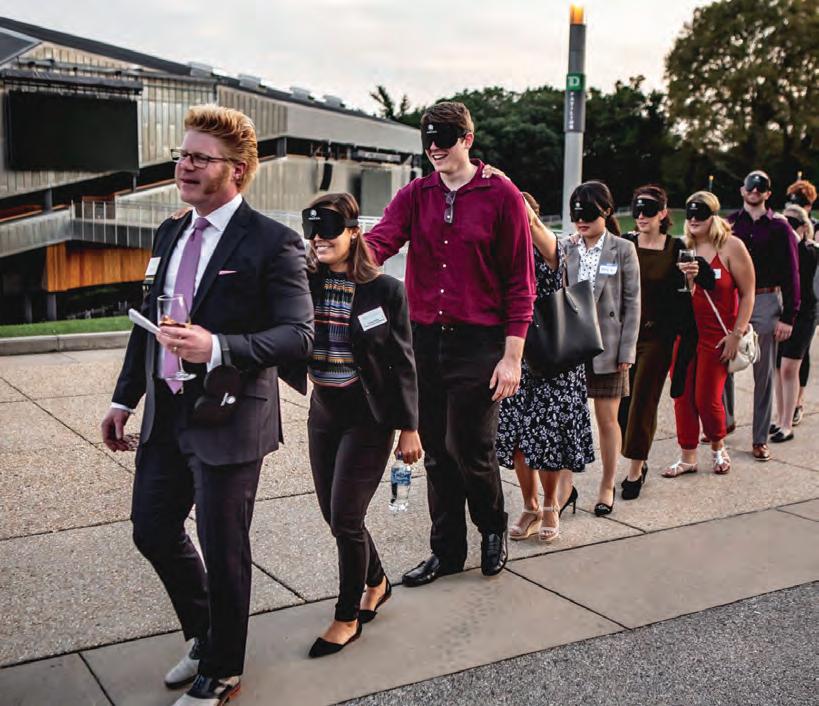
3 minute read
TIPS FROM A PRO
TIPS FROM A PRO»
Q: DOES EVERY EVENT NEED A THEME?
A: Yes, but it doesn’t have to be an obvious one.
BY SUSAN DUNKELMAN
NO MATTER THE SCOPE OR SIZE OF AN EVENT, it’s best to have some sort of common thread that ties everything together. This can be accomplished using décor, lighting, food, floral and even music.
It’s when you don’t have a cohesive look that the attendee experience can feel disjointed and not provide the outcomes you set out to achieve.
The challenge in theming an event is twofold. The first is deciding what your theme will be and the second, how will you best express it to your guests. When you can surprise and delight your attendees, is when you know you have created a unique experience.
Sometimes it’s difficult to know where to begin when creating your overall theme. Hiring a creative special events team is a great first step to take, but it’s crucial that whomever you hire know how to take their ideas (and yours) and transform them, keeping in mind the number of guests, event goals and most importantly your budget. While some event companies may present imaginative mood boards or extensive storyboards that look exciting, a truly successful team will also know how to realistically make them come to life. Even better, they will have the expertise to leverage their vendor relationships to help decide which elements are crucial to expressing your concept versus those that would be nice to have but may not work based on the dollars you have to spend.
We find that the most productive way to work with our clients is to initially present them with a few overall themes, as well as the creative elements that will be used to convey each one. Sometimes a client will respond to an initial theme and settle on it immediately. Other times, clients identify with certain creative aspects of different themes which we then extract to form yet another overall idea. It’s important to gauge how your client is reacting to the concepts you are presenting, as it is one thing for them to see it in proposal form versus how it gets translated for the actual event. The more you can formally define how your theme will visually unfold, the better it will prevent any misconceptions later in the process.
Once you have your team in place, the fun and the planning can begin. Identifying the exact elements of your theme can be challenging because they can originate from so many places. Asking a few important questions can streamline your thought process and narrow your focus. For example, what are the demographics of your attendees? Are you holding your event in a unique location/city that is known for a certain type of food? Is this a branding event where certain colors/messaging need be spotlighted throughout? Are you working with a defined budget where floral and linens will represent the bulk of your theming? Does your event space have certain limitations that should be kept in mind before the creative process even begins?
An often-overlooked part of theme creation is how to present the unexpected. You don’t ever want your attendees to just have a nice time. Instead, somewhere, or around every corner, there should be some creative elements tying into the theme that are a conversation starter. How about a sports team’s marching band to escort guests from dinner to a main event taking place at a stadium? How about life size neon cowboys as you enter a western themed party? Or a staircase lit with hundreds of candles as you enter an elegant museum? Your theme doesn’t have to be obvious, but it does need to provide a common element or look from start to finish. By the end of your event, your guests should come to the realization that no detail, big or small, was overlooked for them, therefore reinforcing the overall impact of the event itself.
Don’t forget: It’s important to convey the theme of the event starting with the invitation as it sets the tone and helps to form the expectations of your guests. You don’t want to give it all away, but you do want the attendee to be intrigued as to what they will experience upon arrival.
AS MANAGING PARTNER OF THE CHARLES GROUP, INC. SUSAN DUNKELMAN CREATIVELY CONCEPTUALIZES MEETINGS AND EVENTS AND PLANS AND EXECUTES THEM TO PERFECTION, DELIVERING MEMORABLE EVENTS BOTH WITHIN THE US AND GLOBALLY. PRIOR TO FORMING THE CHARLES GROUP, INC. IN 1987, SUSAN SERVED AS DIRECTOR OF CONFERENCES FOR THE RISK AND INSURANCE MANAGEMENT SOCIETY (RIMS).










